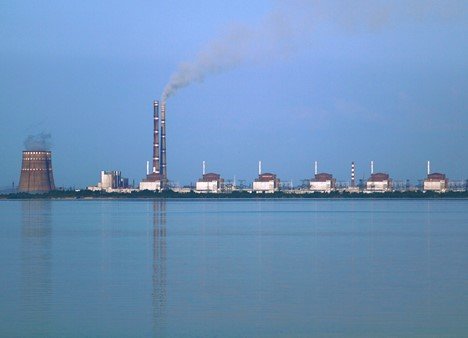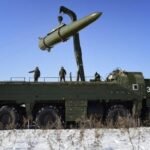The Director General of the International Atomic Energy Agency (IAEA), Rafael Mariano Grossi has expressed concern over the shelling at Europe’s largest nuclear power plant in Ukraine.
On Friday, Russia accused Ukrainian forces of shelling the nuclear plant, which is in Ukraine’s southern Zaporozhye Region. Moscow urged the UN and IAEA to compel Ukraine stop the shelling.
Have you read; Ibom Air makes emergency evacuation of passengers in Lagos
Igor Vishnevetsky, a senior non-proliferation and arms control official at the Russian Foreign Ministry, warned that the shelling of the plant risks triggering an event similar to the 1986 Chernobyl nuclear disaster.
Kiev, meanwhile, blamed Russian troops for shelling of the plant, while US Secretary of State Antony Blinken accused Russia of using the plant as a “shield” for its soldiers.
The plant was seized by Russian forces in late February when Moscow launched its military operation in Ukraine. The facility continues to operate with Ukrainian staff under Russian control.
Russia took control of the nuclear plant after furious battles and shelling, which we at the time also condemned as threatening a nuclear disaster.
At the time Russia took control of the nuclear power plant, the UN’s nuclear watchdog, IAEA said radiation levels and the safety of reactors were not affected.
Mariano Grossi released a statement on Saturday, 6th August 2022, following the shelling of the nuclear facility on Friday.
I’m extremely concerned by the shelling yesterday at Europe’s largest nuclear power plant, which underlines the very real risk of a nuclear disaster that could threaten public health and the environment in Ukraine and beyond.
The IAEA has received information about this serious situation – the latest in a long line of increasingly alarming reports from all sides.
According to Ukraine, there has been no damage to the reactors themselves and no radiological release. However, there is damage elsewhere on the site.
Military action jeopardizing the safety and security of the Zaporizhzya nuclear power plant is completely unacceptable and must be avoided at all costs.
Any military firepower directed at or from the facility would amount to playing with fire, with potentially catastrophic consequences.
I strongly and urgently appeal to all parties to exercise the utmost restraint in the vicinity of this important nuclear facility, with its six reactors.
And I condemn any violent acts carried out at or near the Zaporizhzya nuclear power plant or against its staff.
The Ukrainian staff operating the plant under Russian occupation must be able to carry out their important duties without threats or pressure undermining not only their own safety but also that of the facility itself.
In this highly volatile and dangerous situation, it is more important than ever that the seven indispensable safety pillars that I outlined at the beginning of the war, and that I reiterated at the United Nations in New York last Monday, are fully respected in order to maintain nuclear safety and security.
Ominously, however, almost all have been compromised at the Zaporizhzya nuclear power plant over the past several months, and yet again, in the last 24 hours, several pillars have been violated.
This must stop and stop now.
In order to help prevent the situation from spiralling even more out of control, the IAEA’s presence to provide technical support for nuclear safety and security is of paramount importance.
Since the beginning of this tragic war, the IAEA – and I personally – has been working on supporting Ukraine in keeping all its nuclear facilities safe and secure.
And for the last four months now, I have been ready to lead a mission of IAEA safety, security and safeguards experts to the country’s biggest nuclear power plant, Zaporizhzya.
This mission would play a crucial role in helping to stabilise the nuclear safety and security situation there, as we have at the Chornobyl nuclear power plant and elsewhere in Ukraine in recent months where we have also delivered nuclear safety and security equipment that is urgently needed.
At the same time, IAEA safeguards inspectors would conduct essential verification activities at the plant.
We would also provide impartial and independent information about the status of the Zaporizhzya facility.
That this vital mission has not yet happened is not because of the IAEA. Despite our determined efforts, it has not been possible, so far.
I will not give up. I will continue to push – and push again – for this IAEA mission to finally take place.
But this will need the cooperation, understanding and facilitation from both Ukraine and Russia.
We will also need the United Nations to support us, and I’m very grateful for the steadfast support of UN Secretary General António Guterres.
We can’t afford to lose any more time.
For the sake of protecting people in Ukraine and elsewhere from a potential nuclear accident, we must all set aside our differences and act, now. The IAEA is ready.
Neither Moscow nor Kiev has reacted to the IAEA proposal so far.
Nnamdi Maduakor is a Writer, Investor and Entrepreneur






















































